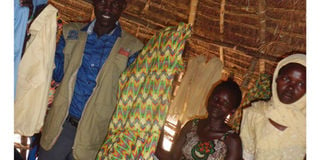Hope through vocational training

Deborah Moriba (centre), a refugee from South Sudan, displays one of the dresses she made at the vocational training facility in Ufua I Refugee Camp in Arua District. Photo by lominda afedraru
What you need to know:
- Female refugees from South Sudan living in Ufua Refugee Camp have a chance at living decently through vocational skills.
Eighteen-year-old Deborah Moriba arrived at Ufua I Refugee Camp in Arua District in October last year. The mother to a five-year-old child was escaping war from her village in Goja, South Sudan.
“At the beginning, the situation was tough because I was very idle. One day, a team of community workers moving from one hut to another sensitising the youth about the importance of vocational training, came to our hut and I immediately registered. We started the training in February 2017,” Moriba says. She can now sow different clothes and designs including dresses, skirts, blouses and shirts including bitenge. The young mother of one says she sells each of her products at Shs3,000 and bitenge at Shs5,000.
Because of this training, Moriba is self-reliant and her child is now in Primary One. She is able to pay the Shs40, 000 for school fees every term.
Moribo says most girls who despised the initiative are now admiring how her life has changed.
Hopelessness
A visit to the camp indicates that most of the population are teenagers and children who are the most vulnerable, especially the girls. However, development partners such as Danish Refugee Council (DRC) have embarked on equipping the girls with life skills. One particular group of girls is being trained in tailoring which they can take up as a business venture to earn a living.
Isaac Khamis, a refugee from South Sudan, also the in charge of the life skills initiative explains that this project started in October 2016 with recruitment of 19 girls all adolescents aged between 15 and 18 years.
“The main aim is to keep the girls busy and reduce the rate of early marriage which is common amongst the refugee population. Trainees are given used bed sheets as materials for training,” Khamis said.
Florence Singa, 18, is an adolescent girl with a hearing impairement, residing in the same camp. Her mother died and she is living with her 70-year-old father aged. Before the war, she was a tailor back home though her training was not sufficient.
From her business in Yei, South Sudan, Singa was able to save $500 (about Shs1.3 million) which she left behind with her brother when the war intensified and has never recovered it.
A bright future
When life became difficult at the camp, Singa attempted suicide but was rescued. In November 2017, she was enrolled as a beneficiary in the social and economic empowerment network.
With the awareness and vocational training, she has hopes for a better future and no longer has suicidal thoughts.
With Singa’s previous knowledge in tailoring, she is now a co-trainer and mentor to the girls at the vocation training facility.
Vivian Kaku, 18, another beneficiary from Lanya village in South Sudan, specialises in making school uniforms for children, which she sells at Shs5, 000.
The project team is in the process of developing business plans for the girls where they will purchase sewing machines for them so that they can put the acquired skills to use and earn a decent living.
About the initiative
The Social Economic Development Network initiative is designed to rehabilitate refugee adolescent youth, mainly girls,
• In life skills such as craft and tailoring
•Prevention of early marriages
•Observing reproductive health, which includes proper sanitary during menstrual periods, avoiding premarital sex
• Avoidance of HIV challenges through unprotected sex
This initiative is in refugee settlements in camps of Ufua 1, 2, 3, and Ariwa in Arua District.



